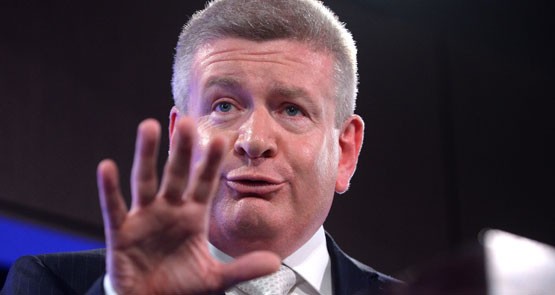
It’s going to be a bleak Christmas for the arts in Australia.
The austerity that began under Tony Abbott and George Brandis continues under PM Malcolm Turnbull and his new Arts Minister, Mitch Fifield. Arts funding has now been cut by a cumulative figure of around $170 million since the Coalition took office in 2013.
Yesterday’s Mid-Year Economic and Fiscal Outlook continued the dismal trend: $52 million was cut from arts funding, with the blow falling mainly on national collecting institutions such as the National Gallery of Australia, National Portrait Gallery, Film and Sound Archive and the National Museum. Job losses in these institutions must now inevitably result.
Screen Australia’s base budget was also cut a further $10 million over three years, despite extra funding for two Hollywood blockbusters in the Alien and Thor franchises. Local filmmakers can be forgiven for asking why critical support for local production will effectively be sacrificed to provide lucrative subsidies for two massive Hollywood studios. Screen Australia’s annual budget has now been cut by around 20% since the Coalition took office.
The Australia Council was spared from further pain yesterday, but that’s not saying much after the massive cuts of the past 18 months. After the trauma of George Brandis’ “Excellence” raid (only partially stemmed by Mitch Fifield), the agency is still $70 million worse off over the forward estimates.
The funding cuts to the Australia Council have taken a while to flow through, but now they are really starting to bite. Last week, the Australia Council announced the results of its September grant round, the first one delivered with a radically smaller grant pool.
As predicted, there was widespread carnage, particularly in certain sectors like literature and youth arts. A number of innovative small magazines and publishers were unsuccessful, such as Seizure and The Lifted Brow. A lot of the smaller writers festivals missed out, too, which will have big flow-on impacts on local authors, many of whom rely on the support of writers festivals for speaking fees and to spruik their books.
Long-suffering scribblers must sense a special irony in the fate of the Book Council of Australia, a 2014 initiative of Tony Abbott set up with $6 million taken from the Australia Council’s budget.
The Book Council was never much more than a lobbying pitch from Melbourne University Publishing’s Louise Adler, who reportedly sold Abbott on the idea on the night of the 2014 Prime Minister’s Literary Awards.
But the Book Council was killed off yesterday. With its first meeting scheduled for January, the council has been consigned to history without ever convening. In a line straight out of Yes Minister, Fifield announced that he “will be consulting widely with the literary community about alternative sector-led mechanisms for representation and promotion”. It’s a graphic example of the chaos in Commonwealth arts policy under the Coalition, where programs have been set up, moved about and cancelled with gay abandon.
To make matters worse, the $6 million of funding taken from the Australia Council to set up the Book Council is not even returning. It has simply vanished into budget savings, never to be seen again. The literature sector is gobsmacked. Even as small magazines are being defunded, the money stripped from the Australia Council has disappeared into Scott Morrison’s ocean of red ink.
Meanwhile, the Australia Council continues to lay off staff; it formally announced that 14 staff were leaving in an email to smaller arts companies last week, though six new positions are being created.
But the real tragedy is unfolding in the youth arts sector, where just three of 13 small companies were funded. The youth arts sector is perennially underfunded, and suffers from poor visibility among policymakers and politicians. Most of them do wonderful things with a few whiffs of an oily rag. The levels of support companies receive is barely more than one of Julie Bishop’s charter flights: between $40,000 and $90,000 per annum.
But Australia’s youth arts sector is disappearing. In 2007, there were 21 federally funded small arts companies working with young Australians. In 2016, there will be four. Fraser Corfield, director of Australian Theatre for Young People, is disconsolate.
“Unless something is done urgently by the Federal Government we are facing the end of a national youth arts sector in Australia,” Corfield wrote in an email this morning. “While the biggest companies might survive, it’s the loss of the many passionate small youth theatre companies nationally that will be devastating for communities and professional artists alike.”
The contrast with the sunny rhetoric of innovation and agility from Turnbull’s Innovation policy last week is striking. As Crikey showed this year — using the Australia Council’s own data — the smaller arts companies are by far the most innovative part of the cultural industries in Australia, including in things like exports and touring. Yet they are the ones being hammered by the current and future funding cuts.
Things are going to get much worse in the new year. In April, the Australia Council will announce its four-year operational funding for smaller companies. With a reduced grant pool, many companies will certainly be defunded. One industry source has already predicted a “bloodbath”.
The looming crisis is all the more painful for the speed with which it has developed. Just two years ago, it seemed as though there was much to look forward to in the cultural sector. Labor’s Creative Australia policy had delivered much-needed reform inside the Australia Council and a healthy envelope of new funding. Australia’s filmmakers could also look forward to stable policy settings and a falling Australian dollar to support foreign investment.
Two years on, Labor’s modest but important legacy in arts policy is in ruins. Increasingly, so is much of the sector.








I’d suggest Australian Citizens wouldn’t be against many of the sorts of grants you list being not merely reduced but cut out entirely. Taxpayers are entitled to see the sorts of largesse tossed around previously by our Politicians being made part of the belt tightening undertaken in a society such as Australia, where we’re patently living beyond our means.
“An exciting time to be an Australian’, Mr Turnbull, is when you realise that the “innovation” you exhort cannot come from the barren rock of unimaginative minds. Art, in all its manifestations, is where a people are moved into a place where the human condition is explored in all its complexities. It is where communication is honed to a form that moves people to observe rather than glance, listen rather than speak, reveal rather than conceal deep truths about themselves. When art speaks it moves people to a higher appreciation of the world they live in and the peoples that inhabit that world. Art practitioners hone their communication skills, learn to read others and understand different perspectives, raise the spirits of people through beauty of language, beauty of form and beauty of musical expression. It is where young minds are shaped into imaginative and innovative human beings. Arts practitioners in small country towns, living on the whiff of an oily rag are already doing extraordinary things with the young, the not so young and the disabled to improve their lives and stimulate their imaginative processes. They enliven the communities in which they dedicate their expertise and their lives. How you have cheapened all that with your swingeing cuts.You have demonstrated the paucity of thought and imagination within your government because the cuts destroy one of the few sectors from which the innovative minds you spout about will spring. You have proven what I long suspected, you are “full of sound and fury signifying nothing.”
What’s wrong with starving in a garret – without cottonwool real art might be created.
Unless, as usual, 99% are talentless poseurs?
Brian Fox, of course as you say, innovation “cannot come from the barren rock of unimaginative minds” but innovations which provide longer term economic benefits to Australian Citizens isn’t coming from the sorts of puerile rubbish all too often benefitting from the taxpayer largesse thrown at them by chattering class dilettantes who influence too much of the grant moneys, is it.
The ‘communications’ occurring in fine arts may move the soul, but that’s a far cry from moving the intellectual aspects of our species in directions required to develop economically useful technologies. If the chattering classes want to develop the talents they imagine are out there, since they’re among those benefitting from economic production in fields of endeavour they never come across in their daily lives, they’re in a better position than most Citizens to put their money where their mouths incessantly bleat.
What does it say about our society that young people bear the brunt of these cuts? Art affords reflection on the way we live, our idea of society, out sense of identity. All of which are gravely needed in Australia. The saddest part about the butchering of the Australia Council was the cutting of the ArtStart program that provided grants to recent graduates – and I say that as a mid-career artist. The upside is that this situation has reinforced a culture of radical thought among younger artists, many of whom are actively seeking alternative modes of practice that do not rely on funding, or on money at all – squatting a rooftop carpark in the city for a one night exhibition, holding a group show in a bombed out car down a Fitzroy alleyway, starting a gallery inside a cupboard on wheels, for some examples. This generation may struggle to make a living from art but I feel hopeful and excited for what they realise as artists.